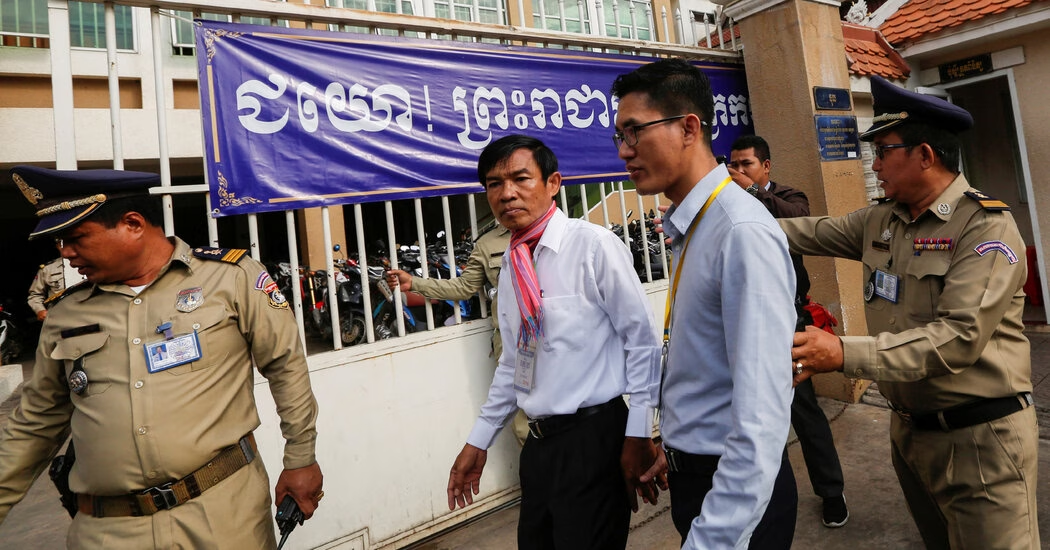The father of Uon Chhin was killed by the Khmer Rouge in Cambodia after being marched to a forest. Before his death, he urged his young son to speak the truth, even if it risked his freedom.
Later, Uon Chhin became a journalist during a time when free press was thriving in Cambodia. However, in 2017, he and a colleague from Radio Free Asia were charged with espionage. This marked the beginning of a decline in human rights in Cambodia under the leadership of Hun Sen, who transformed a young democracy into a dictatorship.
Now, the reduction of American foreign aid and President Trump’s recent executive order to cut funding for organizations like Radio Free Asia and Voice of America are eradicating the remaining space for free speech in Cambodia. Thirty projects funded by the United States Agency for International Development, including those supporting civil society and independent media, have been canceled.
This represents a significant shift in Cambodia, which once served as a laboratory for internationally mandated democracy-building after the Khmer Rouge era, but later became a strongman state.
This situation also highlights the growing influence of China, which is eager to shape the policies of a country in need of financial support and a model for economic development.
Hun Sen, like China, celebrated Trump’s executive order targeting Radio Free Asia and Voice of America, claiming it would help eliminate fake news and disinformation.
Two years ago, Hun Sen transferred power to his eldest son, Hun Manet, who was educated at the U.S. Military Academy at West Point. Despite this change of leadership, Hun Manet has not altered the country’s course. Many independent media outlets have been closed, political parties dissolved by a compliant judiciary, and hundreds of Cambodians who opposed the country’s autocratic direction are either in prison or in exile.
In January, an opposition politician was assassinated in Bangkok, with the Thai police linking the hit to an adviser of Hun Sen.
“In Cambodia, RFA is the last independent media outlet operating in Khmer,” said Bay Fang, the broadcaster’s president, referring to the local language service, which has eight million Facebook followers. “If we close down, the ruling party gets to completely control the narrative. It’s no wonder that Hun Sen celebrated the news of RFA’s possible demise.”
After his release from prison, Uon Chhin found work at a news collective formed by outcasts of other shuttered media outlets. Half of the group’s annual budget of $810,000 came from American aid. The collective, called CamboJA, is now facing financial difficulties, with fears of closure by June. They have even stopped providing drinking water at the office to save $30 a month.
“My colleagues and I, we know that something like this happens in Cambodia all the time, but we never expected it to happen from America,” Uon Chhin said. “It’s like Cambodia and America have traded places.”
There are Cambodian news outlets that manage to make money by avoiding criticism of the Hun family and its associates, including sanctioned individuals. The most popular is Fresh News, which publishes online in Khmer, English, and Chinese. The ruling Cambodian People’s Party, led by the Huns, has ordered officials to use the Fresh News messaging service, CoolApp, instead of foreign options like WhatsApp or Signal.
“Cambodia has complete freedom, more than some countries in the region,” said Lim Cheavutha, founder and chief executive of Fresh News, which is the ruling party’s preferred mouthpiece for spreading information.
As the United States and other Western countries withdraw funding for independent media and democratic institutions, China steps in with financial support that is supposedly not tied to human rights concerns.
Last summer, Heng Sreylin, along with other Cambodian journalists and influencers, embarked on an all-expenses-paid trip to northeast China. She published 20 tourism and culture stories from her journey.
“We don’t have freedom of expression in Cambodia,” said Ms. Heng Sreylin, who works for a small outlet focusing on topics like travel stories and celebrity news. “I do stories that don’t bring problems to me. I don’t want to touch politics.”
Independent journalists have been absorbed into the government. The information minister, Neth Pheaktra, formerly worked as an editor for a respected daily publication that uncovered corruption, political malfeasance, and misconduct by oligarchs.
Now, he praises the Hun dynasty. In his interview, he shared flattering facts about Hun Manet, the prime minister.
“Our prime minister himself, he monitors TikTok and social media and Facebook,” he said. “Sometimes he reads the comments from the local people on his phone.”
Mr. Neth Pheaktra could not answer questions about the media crackdown that led to the closure of numerous outlets in Cambodia because he became information minister in 2023, after the events took place.
Soy Sopheap formerly worked for a Japanese news agency before becoming a pro-government political commentator. He is now the Cambodian co-president of the Cambodia-China Journalist Association, which organizes media tours to China. (He said he does not know who his Chinese co-president is or why he was chosen for this role.)
The group’s founding was celebrated by a diplomat from the Chinese Embassy in Phnom Penh, the capital of Cambodia, as a way to promote positive news about the two countries.
“Human rights are words that the West likes to use,” Mr. Soy Sopheap said. “But China is a dependable friend to Cambodia.”
Ith Sothoeuth, whose new journalistic startup lost U.S. funding, faces an uncertain future without American support. However, he remains determined to continue advocating for free expression.
“If you go with the flow, you are a dead fish,” he said. “If you fight the current, it means you are alive.”




